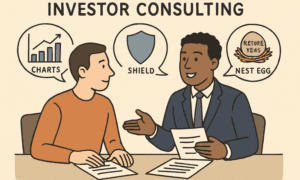When it comes to planning for retirement, there are a lot of things to consider. One of the most important decisions you will make is which retirement plan is right for you. There are many different types of retirement plans available, and it can be difficult to decide which one is best for your needs. In this blog post, we will discuss six tips that will help you choose the right retirement plan!
1) What are your retirement goals and needs?
To choose the right retirement plan, you first need to think about what your retirement goals and needs are. What do you want to achieve during retirement? Do you want to retire as soon as possible? Or do you want to keep working part-time?
Do you want to downsize your home or travel the world? Perhaps you want to switch your plan from a 401k rollover to self directed ira perhaps, or vice versa? Whatever your goals and needs are, make sure that you have a clear understanding of them before moving forward.
If you’re not sure what your retirement goals and needs are, consider meeting with a financial advisor to help you figure them out.
Once you know what your retirement goals and needs are, you can start looking at different retirement plan options to see which one is right for you.
Some factors to consider when choosing a retirement plan include:
– How much money you will need to have saved up in order to retire comfortably
– When you want to retire
– What kind of lifestyle you want during retirement
– If you want to leave a legacy or inheritance for your children or grandchildren
Keep these factors in mind as you compare different retirement plan options.
2) How much can you afford to contribute each month/year to a retirement plan?
When you are looking at different retirement plans, you will want to make sure that you can afford the monthly or yearly contributions. This is important because if you cannot afford the contributions, then you will not be able to fully take advantage of the plan.
Some employers offer matching programs for their employees’ retirement contributions. If your employer offers this type of program, you will want to make sure that you are contributing enough to take advantage of the employer match.
You will also want to consider how long you have until you retire when looking at retirement plans. If you have a longer time horizon, you may be able to afford more risk in your portfolio. However, if you are closer to retirement, you will want to make sure that you are not taking too much risk.
3) What is the vesting schedule for the retirement plan you’re considering?
Since you likely won’t be able to access the money in your retirement account until you’re at least 59.
Vesting schedules are important to consider because they will determine when you actually have full ownership of the money in your account. For example, some vesting schedules may allow you immediate vesting, while others may have a vesting schedule of five years.
If you have a 401(k) through your employer, there’s a good chance that your employer has a vesting schedule in place. So be sure to check with your HR department to find out what the vesting schedule is for your particular plan.
Once you know the vesting schedule, you can start to think about how long you’re willing to wait to have full ownership of the money in your account. If you’re close to retirement, you may not want to wait five years for vesting. On the other hand, if you’re just starting out in your career, a five-year vesting schedule may not be a big deal.
4) Are there any fees associated with the retirement plan, and are they worth it in terms of investment returns and other benefits?
Of course, you’ll want to consider fees when choosing a retirement plan. However, don’t let fees be the only factor in your decision. Consider the fees in relation to the investment returns and other benefits of the plan. If the fees are high but the investment returns are good, it may still be worth investing in the plan.
Another important factor to consider is the level of risk you’re comfortable with. Some retirement plans are more risky than others, and there’s no right or wrong answer when it comes to risk. It’s important to think about how much risk you’re willing to take on and choose a retirement plan accordingly.
5) What is the expected rate of return on investments made through the retirement plan over time periods that match your goals (5, 10, 20 years)?
As you compare retirement plans, you’ll want to know how much your money is expected to grow. The average annual return for the stock market is about 11%, but this number can be higher or lower in any given year. If you’re investing in a target-date fund, your rate of return will depend on how that fund is invested.
Generally, the longer you have until retirement, the more risk you can take with your investments. That’s because you have more time to make up for any losses that occur in down years.
If you’re closer to retirement, you’ll want to focus on preserving the money you’ve already saved. That means you may need to invest more conservatively.
For example, if you’re retiring in the next five years, you might put most of your money into bonds instead of stocks.
When it comes to choosing a retirement plan, there’s no one-size-fits-all solution. The key is to find a plan that fits your unique circumstances.
6) How easily can you make changes to your contribution amount or investment options if your financial situation changes down the road?
One of the biggest mistakes people make when choosing a retirement plan is not taking into account how their financial situation may change in the future. If you think there’s a possibility that you may need to adjust your contributions or investment options down the road, make sure to choose a plan that will allow you to do so easily. Otherwise, you could end up stuck in a plan that no longer meets your needs.

In the end, these are a few key factors to keep in mind when choosing the right retirement plan. Doing your research and knowing what you want is critical. There are many options available and it can be overwhelming, but taking the time to find the right fit will pay off in the long run. Good luck!



































